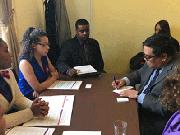BALTIMORE — Like the estimated 1.5 million Americans who have lupus or some form of the illness, Essex High School student Kayura Gwynn admitted confusion and sadness when doctors first diagnosed her a little more than three years ago.
“I had never heard of lupus before so the diagnosis was scary and strange,” said Kayura, now 15. “I was sad because I had gone so long not even realizing my body was showing signs of sickness.”
There are four different forms of the invisible autoimmune disease that doctors find difficult to diagnose, according to medical experts.
Courtesy Photo
Kayura Gwynn (middle) in Washington, D.C. with her father Marcel Gwynn (left) his wife Jen speaking with Walter Gonzales (across the table) Legislative Director in Representative Dutch Ruppersberger’s (D-MD) office.
Systemic lupus, wherein about half of the cases a major organ or tissue in the body, like the heart, lungs, kidneys or brain are affected, counts as a popular form, while cutaneous lupus, which affects just the skin, accounts for approximately 10 percent of all cases.
Drug-induced lupus also accounts for 10 percent of all cases and is caused by high doses of certain medications and finally, neonatal lupus is a rare condition in which the mother’s antibodies affect the fetus.
The disease is two to three times more prevalent among female minorities than white women and recent research indicated that lupus affects one in 537 young African-American women.
“At the time of the diagnosis, we were treating Kayura at a dermatologist for what we thought was acne,” said Marcel Gwynn, Kayura’s father.
“After about four months or so with no improvement, they did a biopsy and Kayura hit on four of the seven lupus makers,” he said. “My wife called me and told me, and I cried. I was scared because I knew nothing about lupus and I was angry because I felt like it was my fault and that my daughter didn’t deserve this.”
However, Kayura and her family have been fighting to defeat the disease, not just for her but for everyone.
While she still fights fatigue, a common symptom of lupus that makes it difficult to attend school or socialize with friends, Kayura has been on a mission to educate those with a lack of knowledge, including teachers and classmates.
Last Saturday, she joined hundreds of Baltimore residents for the Lupus Research Alliance’s “Walk with Us to Cure Lupus” at Rash Field in the Inner Harbor to raise funds for research.
Kayura also started an advocacy club at her school after visiting Washington on behalf of the Lupus Research Alliance. After grabbing the attention of some lawmakers, Kayura wanted to help her peers better understand lupus.
“You don’t look sick. I hate when people tell me this because even if I don’t look sick, inside I am exhausted and sick to the point where I don’t want to do anything at all,” she said. “But I still try to do as much as I can, even if I don’t feel up to par.”
The perception of laziness has been an issue she’s been forced to deal with because of the extreme fatigue the disease causes, her father said.
“Often, she cannot participate in a lot of things or she sleeps later than most,” he said. “Sometimes, it is extremely difficult for her to get out of bed.”
Tired of being perceived as “lazy,” educating others about her disease is proving important to Kayura, not only for her to be better understood but to also help people recognize possible signs of lupus and to see their doctor.
Because May is designated as Lupus Awareness Month, Kayura has been busy trying to shine a spotlight on the disease.
“The Lupus Research Alliance walk is extremely important. It brings the lupus community together and we support each other because we all know what it is like to either be told we are lazy or faking our sickness or just to have this feeling of being alone in our sickness,” she said. “Hopefully getting more people aware and involved with lupus will stop this lonely feeling or the constant remarks on our work ethics because we don’t outwardly show symptoms of being sick.”
The walk was very important, her father said.
“The lack of knowledge by the public coupled with the uniqueness of lupus to each person it affects makes it harder for people to understand how truly serious this disease is,” he said.

